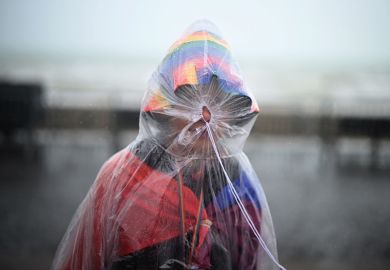In discussions about "Britishness" past, present and future, the views of historian Linda Colley have attracted interest at the highest level of government.
She delivered a millennium lecture on Britishness in 1999 in the presence - and at the request - of Tony Blair. Notably unafraid of the big questions, she has produced seminal books on "forging the nation" and the underside of empire. And she has now spurred the British Library to mount a major exhibition, Taking Liberties: The Struggle for Britain's Freedom and Rights.
"It started some years ago when I spoke to the chief executive, Dame Lynne Brindley, about the idea. There are these wonderful documents: the Petition of Rights, the Magna Carta, the Great Reform Act. People may have vaguely heard about them, but very often they don't know what they are. I felt that, given that the British Library has the originals of many of them, they would make the nucleus of a wonderful exhibition."
In making it happen, the library has brought together Civil War banners, General Strike newspapers and Charles I's death warrant; crucial radical, feminist and Irish nationalist texts; and details of courageous freedom fighters from 18th-century printers to the secretive 1960s Spies for Peace, who revealed the existence of government-built nuclear bunkers. The documents are displayed in a way that encourages visitors to reflect on what life without rights would be like, and just how hard-won British liberties really were.
British born and educated, Colley taught for many years at Yale University and is now Shelby M.C. Davis 1958 professor of history at Princeton University. She has spent almost two decades in the US, coping with the challenges of teaching British history to students "both highly intelligent and motivated, and utterly ignorant of the specifics".
She explains how the themes of the exhibition tie in with her earlier work.
"I think it was partly going to the US that made me think about Britain and things British in a different way. Looking at Britain from afar and within the map of Europe, it was perfectly clear to me that England, Wales and Scotland were overwhelmingly Protestant countries in the 18th century surrounded by countries that were mainly Catholic.
"Surely that needed to be talked about more? When I was in Britain, I was preoccupied by divisions within different groups of Protestants. That's true, but Protestant solidarities are also true and important."
Some of this fed into Colley's celebrated book, Britons: Forging the Nation 1707-1837 (1992). Great Britain has existed only since the Treaty of Union in 1707 (and the United Kingdom since the Act of Union in 1800). Colley argues that Britishness was "superimposed" on a set of earlier identities and loyalties. The nature of this process also explains why things have inevitably started to unravel.
"As an invented nation," she writes, "heavily dependent for its raison d'etre on a brutally Protestant culture, on the threat and tonic of recurrent war, particularly war with France, and on the triumphs, profits and Otherness represented by a massive overseas empire, Britain is bound now to be under immense pressure... The Other in the shape of militant Catholicism, or a hostile European power, or an exotic overseas empire is no longer available to make Britons feel that - by contrast - they have an identity in common."
Britons became part of a wider debate and, predictably, led to conflicting claims that Colley was "really" trying to defend - or to destroy - the Union. She was then invited to deliver a millennium lecture on "Britishness in the 21st century".
This was an opportunity she could hardly refuse - "one is not offered the chance to lecture to one's Prime Minister that often" - although she also believes that "it's very useful for historians to meet practising politicians, look at the pressures they are under, get a brief sense of how their minds work - and what very different creatures they are from academics".
"I argued (in the lecture) for a shift in questions and interests," she recalls. "I personally don't think that banging on and on about 'Britishness' is the way to go, and I now think there are two more important things: the language of citizenship needs to be thought about much more, and (we need to ask) what the United Kingdom is for.
"We have a paradoxical situation where the bulk of MPs are still unionist, but people don't actually talk about the United Kingdom. Unless politicians and people think that the UK serves a function - that we are better off together than apart - we might as well give up."
Colley's next book, Captives: Britain, Empire and the World 1600-1850 (2002), was an even more ambitious attempt to "to rewrite the British, so that they can be put more accurately in their place in global history".
"Britain's marked limits in terms of geographical size, population, armed forces, and, for a long time, military technology," she notes, led one commentator in 1810 to describe the "global pretensions" of empire as "an oak planted in a flower-pot". It was always overextended and desperately dependent on local support to keep control of widely scattered territories.
And behind the facade of complacency and power, the foot soldiers of empire were always vulnerable, to death, disease - and capture by enemies such as the Barbary corsairs of North Africa, Native Americans or the rulers of Indian states. Drawing on more than 100 "captivity narratives", Colley revealed an empire that was far less solid and secure than its supporters, its critics and many of its historians tend to imagine.
Captives generated a sort of spin-off, The Ordeal of Elizabeth Marsh (2007), about the adventurous career of one particular imperial captive, which Colley describes as "a parable about the early stages of globalisation".
Long residence outside the UK has also made her reflect on an aspect of national identity highly relevant to the British Library exhibition. "Having spent so much time in a polity that takes written constitutions for granted - Americans have a kind of idolatry for their constitutional documents - made me curious why the British came to feel that written constitutions were not for them."
This has led to future plans for a big book exploring what she sees as an interesting tension in British development in the late 18th, 19th and 20th centuries.
"Everybody knows that the United Kingdom doesn't have a written constitution, and its political elite claims it doesn't believe in written constitutions. And yet, because Britain was an imperial power, it was forever drafting written constitutions and Bills of Rights for other parts of the world. There used to be this great pack of constitutional lawyers in government service who were told, 'We think Nigeria's going to be independent shortly, so draft us a constitution for Nigeria!'?"
Some of these issues remain very current. We live in times of constitutional flux, with the creation of a Supreme Court, due to start work next year, and calls for further reform of the House of Lords, for UK-wide or specifically Scottish Bills of Rights, and even for a separate English parliament. There is talk of a Constitution Renewal Bill.
All this gives Taking Liberties considerable topical appeal. Working with a team at the British Library, Colley took on the role of guest curator and contributed a 6,000-word commentary that is published in the format of an old-style political pamphlet, as distinct from the lavishly illustrated book that sets out the historical background.
So how did she and her fellow curators hope visitors to Taking Liberties would come to understand the long struggle for Britain's freedom and rights?
"We were all anxious to avoid the old-fashioned Whiggish celebratory view - the march of liberty from great document to great document, where it just gets better and better. It wasn't like that. But neither does one want to go to the opposite extreme and say that this was all cynical, manipulative, (that) these documents were just ruling-class exercises we want to debunk.
"The language of liberty, even if it seems absurdly overblown, can itself control and structure events. Politicians sometimes found themselves bound by the very libertarian rhetoric they had thought to find convenient."
A case in point is the notion of a great tradition of "British liberty". This was always historically simplistic: the franchise in England may have been comparatively broad in the early 18th century, but it was one of the narrowest in Europe by the start of the 20th.
Yet reformers found ways to use this mythical idea for their own ends. "When abolitionists started to refer to slaves as 'fellow subjects' or 'British subjects', this was an adroit and libertarian thing to do. If you were a British subject, you were owed protection."
The ban on the slave trade, in other words, came about partly by calling the bluff of the ruling classes, forcing them to live up to their own rhetoric and self-image.
More generally, Colley hopes that "the element of argument and debate and contention will come through in the items on display in Taking Liberties. The exhibition focuses on particular flashpoints and rounds them out.
"Votes for women is a particularly developed one simply because the British Library has so much material - pro-suffragette novels; anti-suffragette novels; a wonderfully double-edged cartoon making fun of suffragettes being force-fed, which now looks horrendous. We show a wide spectrum of responses to particular issues so people realise that, in the past as now, talk about rights is very exciting, very compelling - and immensely divisive."
While it is obviously not for Colley and the British Library to preach about how the constitution should be changed - although visitors will get a chance to record their own views - she does offer one piece of exhortation.
"It can't do any harm to remind people how hard the struggle to get the vote was in this country. Many of the men who fought and died in the First World War, wearing British uniform, had never exercised the right to vote, because they wouldn't have been enfranchised. That can come as a shock to people. And if they knew that, it might make them think a bit more carefully about exercising their own right to vote."
Register to continue
Why register?
- Registration is free and only takes a moment
- Once registered, you can read 3 articles a month
- Sign up for our newsletter
Subscribe
Or subscribe for unlimited access to:
- Unlimited access to news, views, insights & reviews
- Digital editions
- Digital access to THE’s university and college rankings analysis
Already registered or a current subscriber? Login



